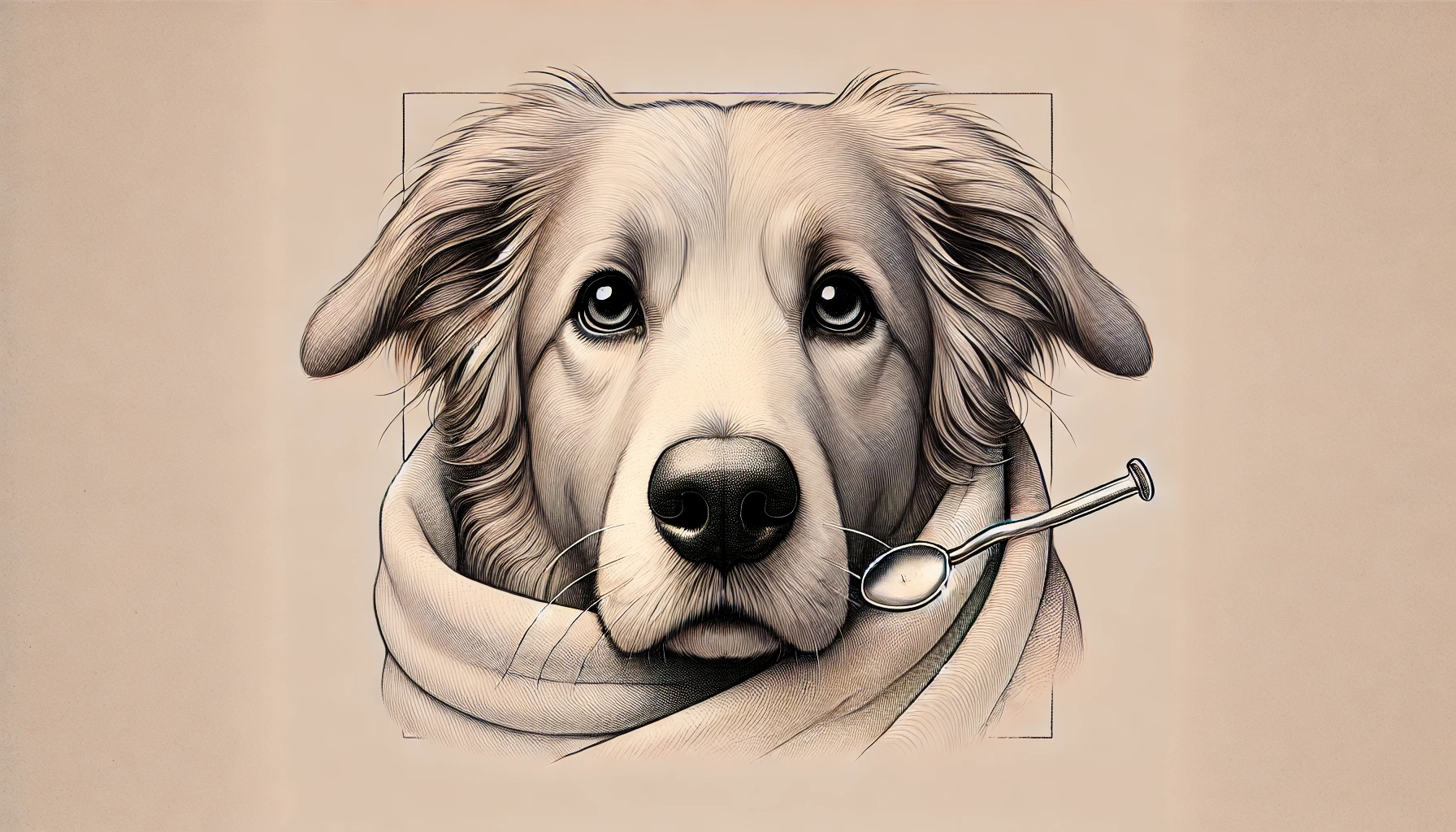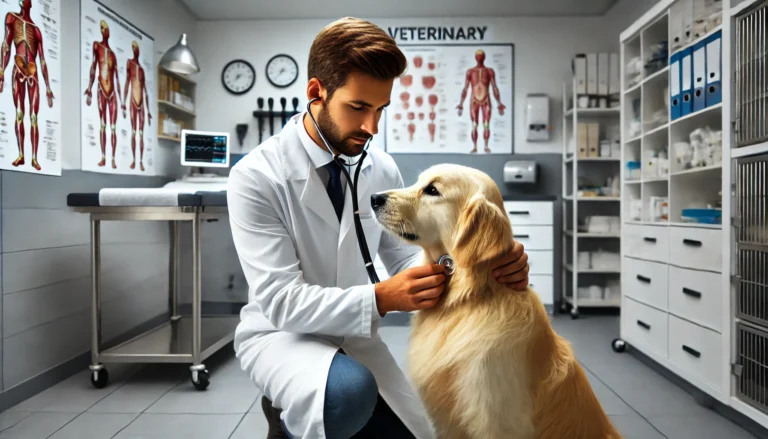Can Dogs Catch a Cold? Essential Dog Health Insights

Introduction
As pet owners, we often wonder, can dogs catch a cold from humans? Understanding how respiratory illnesses affect dogs is crucial for their well-being. Let’s explore whether dogs can get colds, symptoms to watch for, and how to keep our furry friends healthy.
Can Dogs Get a Cold?
Contrary to popular belief, dogs cannot catch the common cold from humans. The viruses responsible for human colds are highly species-specific and do not infect dogs. However, dogs can suffer from respiratory infections caused by other pathogens.

Respiratory Infections in Dogs
1. Kennel Cough (Canine Infectious Respiratory Disease)
Cause: Kennel cough is primarily caused by a combination of viruses and bacteria. The most common viral culprits are the canine parainfluenza virus and canine adenovirus type 2. These viruses damage the lining of the respiratory tract, making it easier for bacteria like Bordetella bronchiseptica to infect and further irritate the airways.
Symptoms: The hallmark symptom of kennel cough is a persistent, forceful cough that can sound like honking. Other symptoms may include sneezing, runny nose, and eye discharge. In mild cases, dogs often remain active and maintain a normal appetite, but severe cases can lead to lethargy and a reduced appetite.
Treatment: Treatment typically involves rest, isolation to prevent spreading the infection, and monitoring. In more severe cases, veterinarians may prescribe antibiotics to combat bacterial components of the infection and cough suppressants to ease discomfort. Vaccines are available to help prevent disease caused by some of the agents involved in kennel cough, such as parainfluenza and Bordetella.
2. Canine Influenza
Cause: Canine influenza is caused by specific influenza viruses adapted to dogs, notably strains H3N8 and H3N2. These viruses are highly contagious among dogs but are species-specific and do not typically infect humans.
Symptoms: Similar to human flu, canine influenza symptoms include coughing, sneezing, fever, lethargy, and nasal and ocular discharge. Some dogs may develop more severe symptoms, such as high fever and pneumonia.
Treatment: There is no cure for the virus, so treatment is supportive. This includes maintaining hydration, administering antiviral drugs (if recommended by a vet), and giving antibiotics to prevent or treat secondary bacterial infections. Vaccines against canine influenza are available and recommended for dogs at high risk of exposure, such as those that attend doggy daycare or frequently visit dog parks.
3. Other Respiratory Issues
Cause: Other respiratory issues in dogs can include bacterial or viral pneumonia. These infections can develop on their own or as secondary infections in dogs already weakened by another illness or condition.
Symptoms: Symptoms of pneumonia in dogs can be severe and may include labored breathing, coughing, fever, and lethargy. Dogs with pneumonia will often exhibit a reduced appetite and may have a nasal discharge that is purulent or tinged with blood.
Treatment: Pneumonia is a serious condition and requires prompt veterinary care. Treatment typically involves antibiotics to combat bacterial pneumonia and may include fluids to maintain hydration and medications to control fever and pain. Hospitalization may be necessary in severe cases to provide intensive care, including oxygen therapy and intravenous medications.
Understanding these common respiratory infections in dogs is crucial for early detection and treatment, which can greatly improve the outcome for affected pets. Regular veterinary check-ups and vaccinations are key in preventing these diseases and keeping dogs healthy.
Symptoms of a Dog Cold
- Runny Nose: Clear or mucous-like discharge from the nose.
- Coughing: Persistent cough, sometimes with a honking sound typical of kennel cough.
- Sneezing: Occasional or frequent sneezing episodes.
- Fever: Elevated body temperature, indicating an immune response.
- Lethargy: Reduced activity levels and increased rest.
Can Dogs Catch a Cold from Humans?
Dogs cannot catch colds from humans because the viruses that cause the common cold in humans are specific to our species and do not infect dogs. However, dogs have their own respiratory viruses, such as canine influenza and kennel cough, which cause symptoms similar to a cold. To protect your dog, ensure they are vaccinated against these canine-specific respiratory illnesses. Good hygiene and limiting exposure to sick dogs or crowded areas can also help prevent these infections. Always monitor your dog for any signs of respiratory distress and consult a veterinarian if symptoms appear.
Preventing Respiratory Illnesses in Dogs
1. Vaccination
Importance: Vaccination is a crucial preventive measure that provides immunity against specific pathogens known to cause respiratory illnesses in dogs. By stimulating the immune system to produce antibodies, vaccines prepare your dog to fight off infections more effectively.
Key Vaccines:
- Kennel Cough: Vaccines against Bordetella bronchiseptica, one of the primary bacterial causes of kennel cough, are available. Often recommended for dogs that frequently interact with other dogs in settings like kennels, parks, or shows.
- Canine Influenza: Vaccines for canine influenza virus strains H3N8 and H3N2 can significantly reduce the risk of your dog contracting canine flu and may lessen the severity of symptoms if they do catch the virus.
Schedule: Vaccination schedules vary based on the dog’s age, health, and lifestyle. Regular consultations with a veterinarian can ensure that your dog’s vaccinations are up to date.
2. Hygiene
Importance: Maintaining good hygiene is essential to prevent the spread of infectious agents. Pathogens can linger on surfaces and in the environment, waiting to be picked up by your dog.
Hygiene Practices:
- Cleaning Living Areas: Regularly clean and disinfect your dog’s living space, including sleeping areas, crates, and play areas, using pet-safe disinfectants.
- Grooming Tools: Clean and disinfect grooming tools like brushes, combs, and bathing supplies. This prevents the spread of skin and fur-borne pathogens.
- Personal Hygiene: Regularly bathe and groom your dog to remove dirt and microbes from their coat and skin, paying particular attention during peak illness seasons.
3. Avoid Exposure
Importance: Minimizing your dog’s exposure to sick dogs and crowded places can dramatically reduce their risk of contracting respiratory illnesses.
Practical Steps:
- Avoid Crowded Places: During outbreaks or peak seasons for respiratory illnesses, avoid taking your dog to heavily populated dog parks, kennels, or doggy daycare facilities.
- Isolate Sick Dogs: If you own multiple dogs and one becomes ill, isolate the sick dog from the others to prevent the spread of the illness.
- Monitor Health: Keep an eye on the health of dogs your pet interacts with and avoid contact with any that show signs of respiratory distress.
Additional Tips:
- Ventilation: Ensure that your dog’s environment is well-ventilated. Stale air can harbor respiratory pathogens longer.
- Stress Reduction: Stress can weaken a dog’s immune system. Maintain a stable routine and provide a calm, supportive environment for your pet.
Treatment for Dog Colds
1. Medications
Antibiotics: If a bacterial infection is suspected or confirmed, your veterinarian might prescribe antibiotics. These are effective in treating bacterial causes of respiratory illness, such as Bordetella in cases of kennel cough. It’s crucial to follow the prescribed dosage and duration to ensure the infection is fully eradicated.
Antivirals: For viral infections like canine influenza, antiviral medications may be prescribed. These drugs help reduce the severity and duration of the infection by inhibiting the replication of the virus. Antivirals are not commonly used but may be recommended in severe cases.
Cough Suppressants: If your dog has a persistent cough that is causing discomfort or affecting their rest, a vet might prescribe cough suppressants. These medications help reduce the cough reflex, allowing for better rest and recovery.
Other Medications: Depending on the dog’s symptoms and the severity of the disease, additional medications like decongestants or anti-inflammatories might be used to manage specific symptoms such as nasal congestion and inflammation.
2. Supportive Care
Rest: Just like humans, dogs need plenty of rest to recover from illness. Limit physical activity and provide a comfortable, quiet place where your dog can relax without being disturbed.
Hydration: Keeping your dog hydrated is crucial, especially if they have fever or are losing fluids through discharge or panting. Provide fresh water at all times and encourage your dog to drink. In cases of severe dehydration, subcutaneous or intravenous fluids may be administered by a veterinarian.
Nutrition: A dog with a respiratory infection may have a reduced appetite. Offer small, palatable meals that are easy to consume. Warm, soft foods can sometimes be more appealing to a sick dog and are easier on the throat if coughing is a symptom.
Humidification: Using a humidifier in the room where your dog sleeps can help soothe respiratory passages and ease breathing. Moist air can help loosen nasal mucus, making it easier for your dog to breathe.
Stress-Free Environment: Stress can hinder recovery, so it’s important to provide a calm environment. Avoid changes in routine and keep your dog’s environment as serene as possible.
Monitoring and Follow-Up
Regular Monitoring: Keep a close eye on your dog’s symptoms and behavior. Note any changes in the frequency or intensity of coughing, sneezing, breathing difficulties, or changes in appetite or activity level.
Follow-Up Visits: Follow-up visits to the vet might be necessary to assess progress and adjust treatment as needed. It’s important to complete the full course of any prescribed medication, even if your dog appears to be feeling better.
Do You Know
While flat-faced cats are undeniably charming, they are prone to certain health issues due to their unique facial structure. Brachycephalic breeds can experience respiratory problems, such as snoring, wheezing, and difficulty breathing, due to narrower air passages. They may also be more susceptible to dental issues and eye problems, including tear duct overflow and eyelid abnormalities.
Conclusion
While dogs cannot catch the common cold from humans, they are susceptible to other respiratory illnesses. Understanding the symptoms and taking preventive measures are crucial for maintaining your dog’s health. By being proactive and attentive to their well-being, you can ensure your canine companion stays happy and healthy.
In conclusion, dogs have their own set of respiratory issues, and while they can’t get a cold from humans, they still need careful attention to maintain their health and prevent infections.
How do I know my dog has a cold?
If you’re wondering “Can Dogs Catch a Cold?”, the signs to look for include symptoms like sneezing, a runny nose, coughing, or watery eyes. These are common signs of a dog cold. Additionally, your dog might appear lethargic or have a decreased appetite. If these symptoms persist, consult a veterinarian for further evaluation.
Can a dog catch a cold from a human?
The answer to “Can Dogs Catch a Cold?” is no, dogs cannot catch a cold from humans. The viruses that cause human colds are specific to people and do not infect dogs. While dogs may experience cold-like symptoms from different pathogens, they cannot contract a human cold.
How to treat a dog with a cold?
If you’re asking “Can Dogs Catch a Cold?” and your dog is showing symptoms, treatment will focus on supportive care. Provide a warm, quiet place for rest, ensure they stay hydrated, and offer soft food if needed. Your vet may prescribe medications like cough suppressants or antibiotics if a bacterial infection is suspected.
What does a dog with a cold sound like?
A dog with a cold might exhibit a variety of sounds, like coughing or sneezing. If you’re wondering “Can Dogs Catch a Cold?” and your dog is coughing, it may sound dry or honking. A congested dog cold may cause sniffling or raspy breathing due to nasal discharge.
Do dogs know when you have a cold?
Dogs may not understand “Can Dogs Catch a Cold?” in human terms, but they can detect changes in your scent when you’re sick. They may sense that you’re not feeling well and respond by staying closer to you, offering comfort through their natural empathy.
What does a dog cough sound like?
If you’re asking, “Can Dogs Catch a Cold?” and your dog is coughing, it may sound like a dry, persistent hacking or even a honking noise, especially in cases of kennel cough. This sound can also occur in a dog cold, so it’s important to monitor your dog’s condition and seek vet advice if the cough persists.
What are the signs of a dog being cold?
Dogs might feel physically cold if they’re not adequately warmed, and you might wonder, “Can Dogs Catch a Cold?” Symptoms like shivering, curling up tightly, or seeking warmth can indicate they’re cold. A dog with a cold might also experience nasal discharge, coughing, and a decrease in activity.
Why do dogs sneeze a lot?
Dogs sneeze for many reasons, but if you’re concerned about “Can Dogs Catch a Cold?”, sneezing could be a sign of an upper respiratory infection. Dogs often sneeze when they have nasal irritation or congestion due to colds or allergies, so it’s important to check for other symptoms like nasal discharge.
How long do dog colds last?
A dog cold typically lasts from a few days to about a week. If you’re wondering, “Can Dogs Catch a Cold?” and how long it lasts, most mild dog colds will resolve with rest and hydration. However, if the symptoms persist or worsen, it may require a visit to the vet for further treatment.
How to treat a dog’s sore throat?
If your dog has a sore throat due to a cold and you’re asking, “Can Dogs Catch a Cold?”, you can treat it by ensuring they stay hydrated and comfortable. Soft food, plenty of water, and avoiding any harsh or cold air can help. Consult your vet for advice on further treatment if necessary.
What are the symptoms of dog flu?
If you’re wondering, “Can Dogs Catch a Cold?”, it’s important to note that the flu in dogs, or canine influenza, has symptoms similar to human flu. These include coughing, sneezing, fever, and nasal discharge. Canine influenza is more severe than a typical dog cold and can lead to complications like pneumonia.
Do dogs get cold at night?
Yes, dogs can feel cold at night, especially if the weather is chilly. If you’re asking, “Can Dogs Catch a Cold?”, keep in mind that they can also develop respiratory symptoms due to the cold. To help, provide them with a warm, cozy spot for sleep and avoid exposing them to extreme temperatures.
Can dogs get cold from humans?
No, dogs cannot catch a cold from humans. The viruses that cause a human cold are not transmitted to dogs. However, if you’re still asking, “Can Dogs Catch a Cold?”, know that they can catch their own cold-like illnesses from other dogs, like kennel cough or canine influenza.
How to help a dog with a stuffy nose?
If your dog has a stuffy nose from a cold, you might wonder, “Can Dogs Catch a Cold?” and how to help. Use a humidifier to add moisture to the air and encourage drinking. Wipe away any nasal discharge gently. If the congestion persists, consult your veterinarian to discuss other treatments.
Can you treat a dog’s cold?
Yes, you can treat a dog cold by offering supportive care like hydration, rest, and a warm environment. If you’re concerned, “Can Dogs Catch a Cold?”, it’s important to consult your vet for any necessary medications, like antibiotics for bacterial infections or cough suppressants to relieve symptoms.
Can dogs get human flu?
No, dogs cannot catch the human flu. If you’re asking, “Can Dogs Catch a Cold?” in relation to human flu, rest assured that the viruses affecting humans do not infect dogs. However, dogs can catch their own flu, called canine influenza, from other infected dogs.
Can dogs have honey?
Yes, dogs can have honey in moderation. If you’re wondering, “Can Dogs Catch a Cold?” and whether honey can help, small amounts can soothe a sore throat or mild cough. However, it should be given as an occasional treat due to its high sugar content.
What medicine can you give a dog for a cold?
If you’re asking, “Can Dogs Catch a Cold?”, your vet may recommend antibiotics if a bacterial infection is suspected or cough suppressants to ease a persistent cough. Always check with your veterinarian before giving any medication, as the right treatment depends on your dog’s specific condition.






